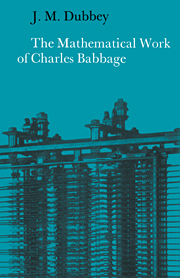Book contents
- Frontmatter
- Contents
- Preface
- 1 Introduction
- 2 British mathematics 1800–30
- 3 The Analytical Society
- 4 The calculus of functions
- 5 ‘The Philosophy of Analysis’
- 6 Miscellaneous papers in analysis, probability and geometry
- 7 Notation
- 8 Babbage and his computers
- 9 Conclusion
- Appendix: mathematical books and papers by Charles Babbage
- Index
- Frontmatter
- Contents
- Preface
- 1 Introduction
- 2 British mathematics 1800–30
- 3 The Analytical Society
- 4 The calculus of functions
- 5 ‘The Philosophy of Analysis’
- 6 Miscellaneous papers in analysis, probability and geometry
- 7 Notation
- 8 Babbage and his computers
- 9 Conclusion
- Appendix: mathematical books and papers by Charles Babbage
- Index
Summary
It is clear that Babbage regarded the question of notation as one of supreme importance in mathematics. Good notation leads to rapid mathematical progress and poor symbolism to stagnation. The history of mathematics shows many examples of the correlation between advances made and the notation used. Babbage believed that in any type of logical reasoning it was essential to take great pains first to derive a notation both simple and comprehensive. Then not only was the immediate working of a problem greatly facilitated but even new and unsuspected results could be suggested. Sometimes a notation could be strong enough to open up new branches of a subject and greatly assist the whole process of mathematical discovery.
Babbage was, as we have seen, very much involved in notational reform in his early career, being born at a time when symbolism was at one of its lowest points in mathematical history. Later, he wrote three long and interesting papers on the subject of notation. These were ‘Observations on the notation employed in the calculus of functions’, Transactions of the Cambridge Philosophical Society, 1821; ‘On the influence of signs in mathematical reasoning’, Transactions of the Cambridge Philosophical Society, 1827, and an article ‘On notation’ for the Edinburgh Encyclopaedia, 1830.
- Type
- Chapter
- Information
- The Mathematical Work of Charles Babbage , pp. 154 - 172Publisher: Cambridge University PressPrint publication year: 1978



